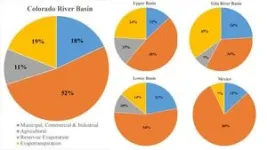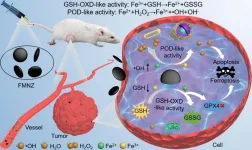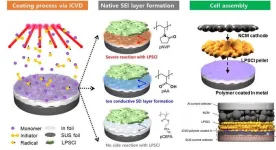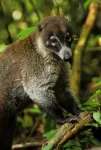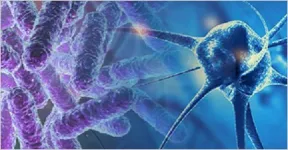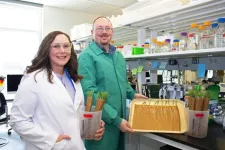(Press-News.org) The Colorado River is a lifeline for many cities and farms in the Southwest United States. It flows for about 1,448 miles before reaching the Gulf of California in Mexico and supplies water to numerous cities and farms along the way.
However, over the past 60 years, the amount of water in the Colorado River has been shrinking. In fact, in some years, the river’s water has been used up completely before it reaches the gulf.
Landon Marston, assistant professor in civil and environmental engineering, teamed up with researchers from multiple universities and nongovernmental organizations to find out where the river’s water goes and who uses it. This effort is informing state and federal decision-makers as they prepare to introduce new measures to bring the basin’s water demands in balance with its dwindling supplies.
The research group, which includes two of Marston’s graduate students, started by quantifying how much water people and businesses used from the Colorado River from 2000-19 from the records of the Bureau of Reclamation. These records serve as the basis for decision-making by local, state, and federal stakeholders concerned about the allocation of the Colorado River.
The group filled in gaps in federal records using a collection of models and data detailing crop-specific water consumption, water exported out of the basin by canals and pipelines, and evaporation from reservoirs and wetlands.
The study found that the agricultural demand for water is significantly higher than the water used by cities. The crops that need the most water are ones used for feeding cattle, such as alfalfa and hay, which are abundant in the area. The states that line the Colorado River raise roughly 14 million cattle per year.
“With water becoming scarcer and reservoir levels dropping, there is a growing need to find ways to use water more efficiently,” said Marston. The reduction of water is crucial and will likely need to increase in the coming years due to competing demands and climate changes that reduce runoff into the Colorado River.
In 16 of the years analyzed, more water was taken from the river than what naturally flowed into it. To make up for the shortage, water was removed from reservoirs along the river, including Lake Mead and Lake Powell, which are among the largest reservoirs in the United States but have now become three-quarters empty.
The researchers found that the amount of water used actually varies a lot from year to year. In recent years, there has been less water used in the Lower Basin because of new rules that require more efficient use of water and cuts to the overall supply.
Another use of a significant amount of water is to support the natural environment along the river, including plants and wetlands.
“This is important because it wasn’t accounted for in previous studies,” said Marston. “This is not just about farms and cities. It is about protecting the river’s ecosystem and ensuring a sustainable water supply for everyone in the southwestern United States.”
Understanding where the water goes is crucial for making informed decisions about water use in the Colorado River Basin.
“The challenges are there,” noted Marston. “But this data provides valuable information that can guide the seven states overlaying the Colorado River Basin and the federal government as they continue to negotiate how to share the dwindling water in the river.”
END
Research to uncover the impact of water use in the Colorado River Basin
Persistent overuse of water and long-term drought has depleted the Colorado River and highlighted the need for a comprehensive understanding of how waters are allocated and used to develop effective management strategies.
2024-05-29
ELSE PRESS RELEASES FROM THIS DATE:
Structural engineering unlocks potent tumor treatment with dual-function magnetite nanozymes
2024-05-29
According to a recent study published in Chemical Engineering Journal, a collaborative research team led by Professor WANG Hui from High Magnetic Field Laboratory, Hefei Institutes of Science of Chinese Academy of Sciences developed magnetite nanozyme (MNZs) with dual enzymatic activities through structural engineering, and proved its structure-dependent behavior in the process of tumor treatment.
MNZs, as a substitute for natural enzymes, has been widely studied in the field of tumor catalytic therapy. However, the catalytic efficiency of traditional MNZs in tumor microenvironment (TME) is often limited, which is mainly due to the low production rate of hydroxyl radical ...
Polymeric films protect anodes from sulfide solid electrolytes!
2024-05-29
People have various relationships in society including those with family, friends, and coworkers. While these relationships play a significant role in our lives, it's crucial to maintain a healthy distance as being too close can lead to intense emotions or conflicts. Interestingly, a recent study in the field of chemistry demonstrates that maintaining such distance can enhance battery performance in electric vehicles.
In this research, Professor Soojin Park, Dr. Sungjin Cho and Youngjin Song, a PhD student, from the Department of Chemistry at Pohang University of Science and Technology (POSTECH) in collaboration with the team of Professor Sung Gap Im ...
Altering cancer treatment dosing could reduce climate impact, study finds
2024-05-29
May 28, 2024
For more information, contact:
Nicole Fawcett, nfawcett@umich.edu
EMBARGOED for release at 6:30 p.m. ET May 28, 2024
Altering cancer treatment dosing could reduce climate impact, study finds
Model estimates potential to reduce greenhouse gas emissions by delivering treatment every 6 weeks
ANN ARBOR, Michigan — Changing how often a popular cancer therapy is delivered would reduce greenhouse gas emissions and improve environmental impact without decreasing cancer survival, according to a new analysis from researchers at the University of Michigan Health Rogel ...
The secret sex life of coral revealed
2024-05-29
Corals play an essential role in ocean ecosystems, and like many organisms, they are under threat from climate change and other human activities. To better protect coral, it’s first necessary to understand them, in particular their reproductive life cycle, which only happens once a year. For the first time, researchers have produced a model for coral spawning, based on various environmental factors. They achieved this by tapping an often overlooked source of aquatic knowledge, an aquarium.
Given their branching shapes or waving tendrils, you would be ...
New deep learning model is ‘game changer’ for measuring embryo development
2024-05-29
Research led by the University of Plymouth has shown that a new deep learning AI model can identify what happens and when during embryonic development, from video.
Published today (Wednesday 29 May) in the Journal of Experimental Biology, the study highlights how the model, known as Dev-ResNet, can identify the occurrence of key functional developmental events in pond snails, including heart function, crawling, hatching and even death.
A key innovation in this study is the use of a 3D model that uses changes occurring between frames of the video, and enables the AI to learn from these features, as opposed to the more traditional use of still images.
The ...
Smarter foragers do not forage smarter
2024-05-29
Primates, including humans, have larger brains than most other mammals, but why? Scientists searching for the answer have long followed a trail pointing to diet—specifically fruit—as the reason for why primates evolved larger brains. A team from the Max Planck Institute of Animal Behavior and the Smithsonian Institute of Tropical Research tested this idea for the first time—finding that the fruit-diet theory might be out of juice. The researchers used drone imaging, GPS tracking, and fine-scale behavioral analyses to test how four species of fruit-eating mammals solved the same natural foraging puzzle in a Panamanian rainforest. They ...
A unified account of Darwinism’s varieties
2024-05-29
A new paper published in The Quarterly Review of Biology examines the question of what Darwinism is and how its nonscientific uses relate to the scientific theory of evolution.
Charles Darwin published On the Origin of Species in 1859 as a work in biology. However, in the past century and a half, Darwin’s ideas have impacted a broad range of domains and stimulated scientists and scholars to advance "evolutionary approaches" in domains as diverse as economics, engineering, psychology, and history. The ideas have been used (and abused) to undermine religiously inspired ideas about the origin of humans and their status concerning other species, ...
Marketers can manage 'feature creep'
2024-05-29
AUSTIN, Texas — Wifi-enabled washing machines. Voice-controlled microwaves. App-enabled TVs, vacuum cleaners, and even window blinds you can control from the comfort of your couch.
Many of the technological features now included in everyday products are useful and accessible. But research has shown that having too many can overwhelm potential buyers, making them less likely to make a purchase.
In new research, Wayne Hoyer, marketing professor and James L. Bayless/William S. Farrish Fund Chair for Free Enterprise at Texas McCombs, digs into the phenomenon of “feature creep” and its impact on consumer sentiment. ...
Intermittent fasting shows promise in improving gut health, weight management
2024-05-29
A new study by researchers from Arizona State University and their colleagues highlights a dietary strategy for significant health improvement and weight management.
Participants following an intermittent fasting and protein-pacing regimen, which involves evenly spaced protein intake throughout the day, saw better gut health, weight loss and metabolic responses. These benefits were notably greater than those seen with simple calorie restriction.
The findings, reported today in the journal Nature ...
Scientists identify gene that could lead to resilient ‘pixie’ corn
2024-05-29
AMES, Iowa – A widely found gene in plants has been newly identified as a key transporter of a hormone that influences the size of corn. The discovery offers plant breeders a new tool to develop desirable dwarf varieties that could enhance the crop’s resilience and profitability.
A team of scientists led by Iowa State University spent years working to pinpoint the functions of the gene ZmPILS6. Now, they have been able to characterize it as an important driver of plant size and architecture, a carrier for an auxin hormone that helps govern growth in roots below ground and shoots, or stalks, above ground. Their findings were published in the Proceedings ...
LAST 30 PRESS RELEASES:
How much sleep do teens get? Six-seven hours.
Patients regain weight rapidly after stopping weight loss drugs – but still keep off a quarter of weight lost
GLP-1 diabetes drugs linked to reduced risk of addiction and substance-related death
Councils face industry legal threats for campaigns warning against wood burning stoves
GLP-1 medications get at the heart of addiction: study
Global trauma study highlights shared learning as interest in whole blood resurges
Almost a third of Gen Z men agree a wife should obey her husband
Trapping light on thermal photodetectors shatters speed records
New review highlights the future of tubular solid oxide fuel cells for clean energy systems
Pig farm ammonia pollution may indirectly accelerate climate warming, new study finds
Modified biochar helps compost retain nitrogen and build richer soil organic matter
First gene regulation clinical trials for epilepsy show promising results
Life-changing drug identified for children with rare epilepsy
Husker researchers collaborate to explore fear of spiders
Mayo Clinic researchers discover hidden brain map that may improve epilepsy care
NYCST announces Round 2 Awards for space technology projects
How the Dobbs decision and abortion restrictions changed where medical students apply to residency programs
Microwave frying can help lower oil content for healthier French fries
In MS, wearable sensors may help identify people at risk of worsening disability
Study: Football associated with nearly one in five brain injuries in youth sports
Machine-learning immune-system analysis study may hold clues to personalized medicine
A promising potential therapeutic strategy for Rett syndrome
How time changes impact public sentiment in the U.S.
Analysis of charred food in pot reveals that prehistoric Europeans had surprisingly complex cuisines
As a whole, LGB+ workers in the NHS do not experience pay gaps compared to their heterosexual colleagues
How cocaine rewires the brain to drive relapse
Mosquito monitoring through sound - implications for AI species recognition
UCLA researchers engineer CAR-T cells to target hard-to-treat solid tumors
New study reveals asynchronous land–ocean responses to ancient ocean anoxia
Ctenophore research points to earlier origins of brain-like structures
[Press-News.org] Research to uncover the impact of water use in the Colorado River BasinPersistent overuse of water and long-term drought has depleted the Colorado River and highlighted the need for a comprehensive understanding of how waters are allocated and used to develop effective management strategies.

